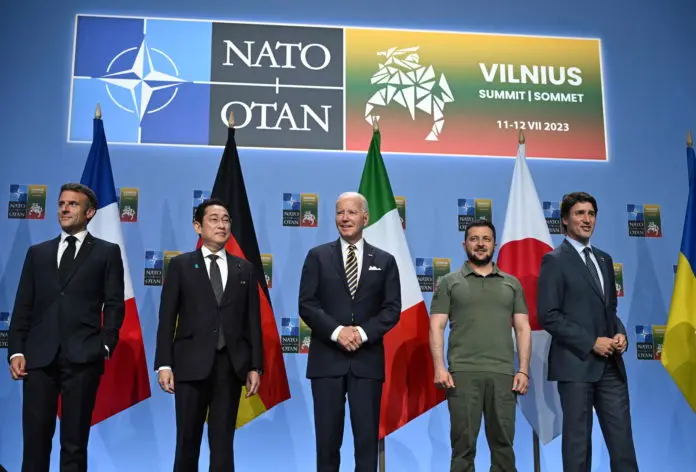- BP: 11482 Yaoundé, Cameroun; Siège: Efoulan, Yaoundé 3
- contact@caessinternational.org

On the second and final day of the NATO summit in Vilnius, nearly 18 months after the start of the war in Ukraine, Ukrainian President Volodymyr Zelensky secured new security guarantees for his country. These are intended to strengthen Ukraine’s defenses against Russia and to deter Moscow from launching further aggression, in lieu of admitting Ukraine to the Alliance for now, as Kyiv had wished.
Indeed, on Wednesday, July 12, the United States and its allies unveiled new security guarantees for Ukraine aimed at helping it withstand Russia’s offensive in the long term. In this regard, the G7 powers (United States, United Kingdom, France, Canada, Germany, Italy, and Japan) committed to providing long-term military support to Ukraine. This initiative includes deliveries of sophisticated military equipment, training, intelligence sharing, and cybersecurity assistance.
In return, Ukraine, which has long pushed for a rapid NATO accession, committed to improving its governance, notably through judicial and economic reforms and increased transparency.
France is following the lead of the United Kingdom in supplying long-range air-to-ground guided missiles. The French government plans to send long-range Scalp missiles to Ukraine, “to send a message of support to Ukraine, NATO unity, and determination that Russia must not and cannot win this war,” according to Emmanuel Macron’s remarks from Lithuania. The Scalp missiles can hit targets up to 250 km away. Additionally, Germany announced an extra €700 million worth of arms, including “launchers for the Patriot air defense system, Marder armored vehicles, Leopard 1 A5 tanks, and artillery shells.”
These new commitments from NATO countries reflect the West’s resolve to prolong the war in Ukraine, excluding the idea of possible negotiations between the two belligerents. However, despite these promises, NATO countries seem hesitant about Ukraine’s NATO membership—an intention which, it must be recalled, was at the root of the current conflict.